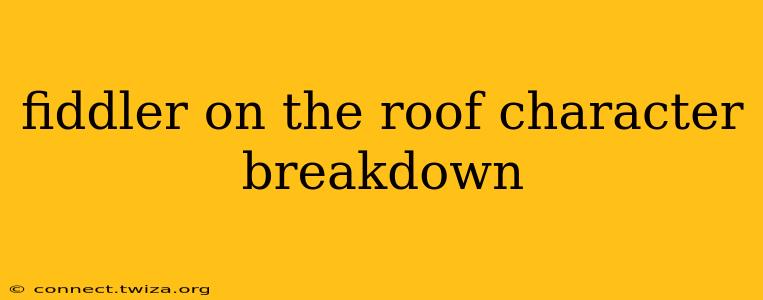"Fiddler on the Roof," a beloved musical based on Sholem Aleichem's stories, boasts a rich cast of characters whose struggles and triumphs resonate deeply with audiences worldwide. This breakdown delves into the major players, exploring their motivations, relationships, and significance to the overall narrative. We'll examine their individual journeys and how they contribute to the themes of tradition, change, and family.
Tevye the Dairyman: The Heart of the Story
Tevye, the central character, is a poor milkman living in the small Russian village of Anatevka. He's a deeply religious man, clinging fiercely to tradition and his unwavering faith. However, Tevye's unwavering faith is constantly tested by the changing world around him. He's a loving father, but his attempts to arrange marriages for his five daughters clash dramatically with their desires for individual autonomy and love. Tevye's internal conflict—between tradition and modernity, faith and doubt—forms the emotional core of the musical. He wrestles with the changing times, questioning God's plan while simultaneously relying on his faith to guide him through the turmoil. His humor and resilience, despite facing profound challenges, make him a relatable and enduring character.
What are Tevye's main conflicts?
Tevye's primary conflict stems from the generational gap between his traditional values and his daughters' desires for independent lives and romantic choices. He struggles to reconcile his deeply held beliefs with the reality of a changing world, and this internal struggle manifests in his interactions with his daughters, his wife, and his community. Furthermore, the looming threat of anti-Semitism and forced displacement adds another layer of conflict, forcing him to confront not only personal changes but also the precariousness of his community's existence.
Golde: The Steadfast Wife
Golde, Tevye's wife, is a practical and pragmatic woman who, while seemingly accepting of tradition, possesses a quiet strength and resilience. While she outwardly supports Tevye's decisions, she also reveals subtle moments of independent thought and even defiance. Her relationship with Tevye is a complex blend of love, respect, and unspoken understanding. Although often depicted as subservient, Golde possesses a sharp wit and quietly challenges Tevye's decisions when necessary. She represents the enduring strength of women within the traditional community.
How does Golde's character evolve throughout the play?
Golde's character doesn't undergo a dramatic transformation like some of the daughters. Instead, her evolution is subtle. She slowly adapts to the changing circumstances, demonstrating her capacity for understanding and compromise. While initially clinging to tradition, she ultimately embraces the changes in her family, demonstrating remarkable adaptability and a capacity for love that transcends rigid social norms.
The Daughters: A Spectrum of Rebellion
Tevye's five daughters each represent a different facet of the changing times and the challenges to tradition. Each daughter’s romantic pursuit presents a unique challenge to Tevye's authority and traditional matchmaking practices.
-
Tzeitel: The eldest daughter, Tzeitel, is the first to challenge tradition by choosing her own husband, Motel the tailor. Her defiance is subtle but significant, representing the beginnings of a shift in the family dynamic.
-
Hodel: Hodel, the second daughter, marries Perchik, a revolutionary student, demonstrating a commitment to progressive ideals and social justice. Her choice further highlights the changing landscape and the daughters' willingness to embrace modern values.
-
Chava: Chava's choice of a non-Jewish suitor represents the most radical departure from tradition, resulting in painful consequences and a poignant exploration of faith, identity, and family loyalty. Her actions highlight the profound clash between tradition and personal desires.
-
Shprintze and Bielke: The youngest daughters, Shprintze and Bielke, are less prominent but still symbolize the younger generation's move away from the constraints of tradition. Their relationships are less central to the plot, but they still contribute to the overall theme of change.
What are the different ways the daughters challenge their father?
Each daughter challenges Tevye in different ways. Tzeitel challenges him directly by rejecting his arranged marriage plan. Hodel challenges him by choosing a non-traditional partner with revolutionary ideas. Chava’s actions are the most radical rebellion, directly defying religious and familial traditions with life-altering consequences. The cumulative effect of these challenges forces Tevye to confront the changing times and the evolving roles of women in his community.
The Supporting Characters: Adding Depth and Complexity
The supporting cast of characters, including Yente the matchmaker, Lazar Wolf the butcher, Motel the tailor, Perchik, and Fyedka, further enrich the narrative. Each character contributes to the story's texture, adding layers of humor, conflict, and social commentary. Their roles illuminate the community's dynamic and the pressures faced by individuals navigating a world on the brink of significant change.
Conclusion: A Timeless Exploration of Change
"Fiddler on the Roof" remains a timeless classic due to its compelling characters and its exploration of universal themes. The character breakdown reveals the rich tapestry of personalities and relationships that drive the narrative. The characters are not simply archetypes; they are complex individuals grappling with the challenges of tradition, change, and the enduring power of faith and family. Through their struggles and triumphs, "Fiddler on the Roof" offers a poignant and enduring reflection on the human experience.
